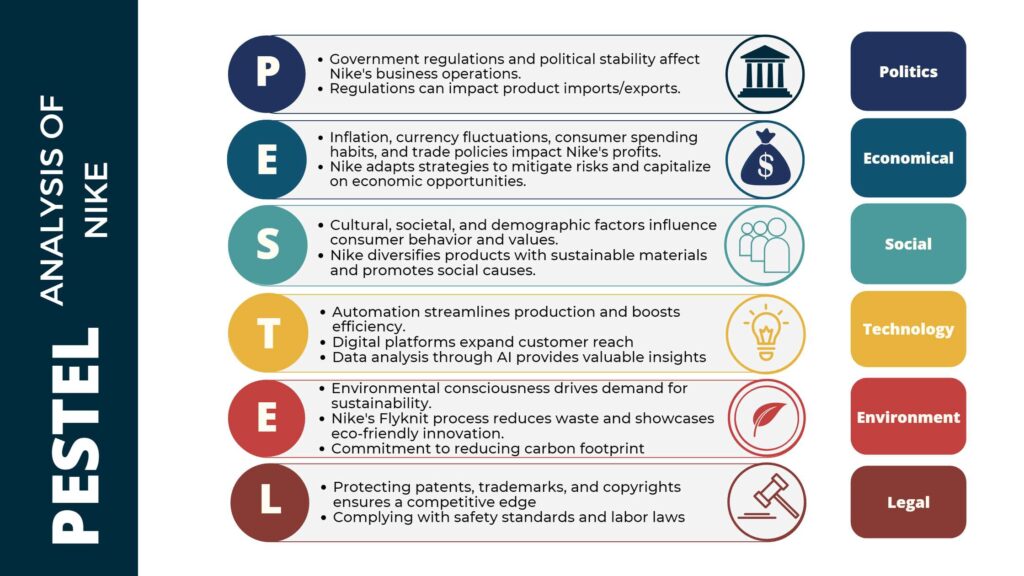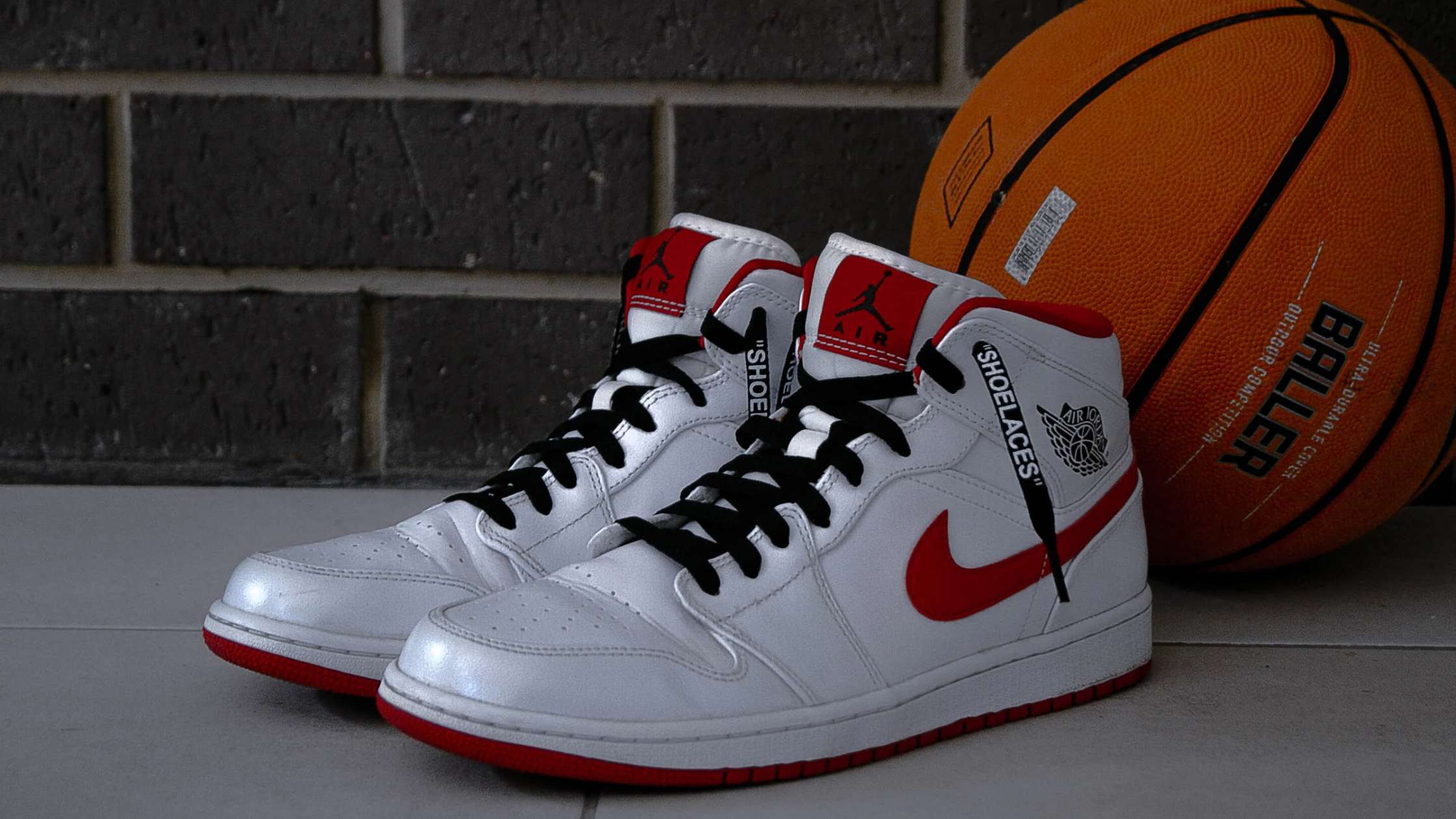Nike is a global leader in the sports footwear and clothing market. Widely known for their iconic symbol, the “swoosh” and strive to be innovative and eco-friendly.
Nike, worth over $200 billion, operates across 190 countries and employs over 75,000 people worldwide. They’re truly a global powerhouse!
As a multinational corporation, Nike is subject to various external factors that can impact its business operations. Nike’s performance can be affected by external factors, and a PESTLE analysis is a great tool to evaluate them.
This article we will conduct Nike PESTLE analysis, and discussing how each factor of Pestle can impact Nike’s operations and identifying potential opportunities and challenges for the company.
Overview of Nike’s Business Operations
Founded in 1964, Nike – design, develop, and sell athletic footwear, apparel, and equipment worldwide. They’re a multinational corp whose products reach people all over the globe.
Headquartered in Beaverton, Oregon, USA, Nike operates in over 190 countries.
Nike’s primary business activities include designing and developing innovative products, marketing and advertising its brand, and managing its global supply chain.
Additionally, Nike operates numerous retail stores globally and engages in e-commerce activities to reach a broader customer base.
Nike’s business operations extend to various functions, including research and development, manufacturing, and distribution.
The company invests heavily in Research & Development to create innovative products that fulfill their customers’ evolving needs.
Nike’s manufacturing facilities are situated in various regions globally, including Asia, Europe, and Latin America.
The company’s distribution network comprises of a combination of direct sales and third-party distributors, ensuring that products reach customers worldwide.
With this understanding of Nike’s business operations, the subsequent section will evaluate the political factors affecting the company’s operations.
Detailed: Nike Pestle Analysis
Political Factors
The political factors that affect Nike’s business operations include government regulations and political stability.
Government regulations can affect Nike’s products and operations, such as restrictions on importing or exporting certain materials.
Political stability is also important for Nike’s operations as political instability can lead to economic volatility and affect consumer spending.
Understanding these political factors is crucial for Nike to operate successfully in different markets around the world.
Government Regulations
Government regulations can have a big impact on the operations and profitability of sports apparel companies, like Nike
Compliance is a key factor in keeping up its status as an ethical and socially responsible business. Over the years, Nike has had to grapple with labor laws, environmental regulations, and product safety standards.
More recently, the focus has shifted to sustainability, and Nike has taken steps to make its supply chain and manufacturing processes sustainable. Unfortunately, regulations can add to costs and reduce profits, which can hurt Nike’s financial performance.
Despite the challenges, Nike has managed to stay in good stead by adhering to government regulations and making their practices sustainable. Political stability is also essential to their success; in countries with political instability, Nike could face difficulties in its operations, such as supply chain disruptions, increased costs, and reduced demand for their products.
To have a long term success, it is essential for Nike to watch the political climate in the countries they’re in and adjust operations accordingly.
Political Stability
Political stability has a great influence on the success of sports apparel companies, like Nike.
For instance, political instability in China, where Nike has a presence, can cause disruptions in production and transportation of goods, leading to delays in delivering products to customers.
Plus, it can bring up raw materials, labor, and transportation costs, which could hurt Nike’s profits.
On top of that, political instability can reduce demand for Nike’s products, as consumers may become more wary of spending money during times of political upheaval.
The impact of political stability on Nike’s operations is significant, as it can affect the company’s bottom line and reputation. Therefore, it is necessary for Nike to monitor any political developments in countries where they operates and take measures to minimize the impact on its operations.
This can include diversifying their supply chain, cultivating relationships with local governments, and setting up contingency plans to address supply chain disruptions.
By doing so, Nike can make sure they’re ready to face the difficulties of political instability, and remain a top player in the sports apparel industry.
Now, looking at economic factors, it’s important to explore how changes in the global economy can affect Nike’s operations.
Economic Factors
Examining the economic factors of the industry reveals a complex and dynamic landscape that demands careful consideration and strategic planning.
Nike operates in a highly competitive industry, where inflation, currency shifts, and consumer spending habits can have a huge effect on their profits.
The following table highlights some of the key economic factors that Nike must navigate to maintain its competitive edge.
| Economic Factors | Impact on Nike | Current Status |
|---|---|---|
| Inflation | Increases production costs and reduces consumer purchasing power | Moderate |
| Currency fluctuations | Affects revenue and profitability due to international operations | High |
| Consumer spending habits | Directly impacts demand for Nike products | Moderate |
| Trade policies | Affects international business operations | High |
As the table shows, Nike faces significant challenges in navigating economic factors that can impact its business operations.
While some factors like inflation and consumer spending habits have a moderate impact, others such as currency fluctuations and trade policies have a high impact.
Therefore, Nike must carefully monitor and adapt its strategies to mitigate these risks and capitalize on opportunities that arise from these economic factors.
Moving onto the next section about ‘social factors,’ the impact of consumer behavior and societal values on Nike’s business operations will be explored.
Social Factors
The social factors of the industry have a major effect on consumer behavior and societal values, which consequently have a big impact on the business operations of companies like Nike.
Social factors like culture, family, friends, education, and media – shapes people’s beliefs, attitudes, opinions, and lifestyles. This affects consumer behavior and societal values, and has a big impact on businesses like Nike.
These factors create a demand for certain products and services, and affect the perception and reputation of brands.
For Nike, the social factors include the growing trend of health and fitness, the increasing awareness of sustainability and ethical sourcing, and the changing demographics of its target audience.
Nike has responded to social trends by:
- Diversifying their product portfolio to include sustainable and eco-friendly materials,
- Promoting social cause by partnering with non-profit organizations,
- Featuring diverse athletes in their marketing campaigns.
By adapting to social factors, Nike has kept their brand image and stayed competitive.
As social factors evolve, Nike needs to keep adapting and innovating their products and services to meet the changing needs and expectations of their consumers.
Technological Factors
Technological advances have revolutionized the way companies in the athletic footwear industry operate. Automation has allowed them to streamline their production processes, cutting costs and boosting efficiency.
Digitalization has transformed customer interaction, giving companies access to a wider audience through e-commerce and social media platforms.
Artificial intelligence has enabled companies to gather and analyze the data – giving them useful insights into consumer preferences and market trends. So that the company can make an informed decision.
However, these advances also bring significant challenges. The increasing use of automation and AI raises worries about the displacement of human workers. Additionally, relying on digital platforms makes companies vulnerable to cyber-attacks and data breaches.
To stay competitive in this rapidly changing technological landscape – companies must continue to invest in innovation and adapt to new technologies, while also managing potential risks and addressing ethical concerns.
Legal factors also play a key role in shaping the operating environment for companies.
So, now let’s look at the legal factors which also have an important role in shaping the environment in which businesses operate.
Legal Factors
Nike, a global leader in the athletic footwear industry, must consider various legal factors that could significantly affect their operations and competitive advantage. This includes intellectual property laws, product safety regulations, and labor laws.
Intellectual property laws are essential for Nike, as they invest heavily in research and development.
If Nike do not safeguard their patents, trademarks, and copyrights, rivals may take advantage of them, reducing their competitive edge and harming their status as innovators. This can be harmful to their business and reputation.
Nike must follow product safety regulations and make sure that their products meet safety standards set by organizations like the CPSC in the US or they’ll face lawsuits, fines, and damage to their reputation.
Nike must abide by labor laws, paying their workers the minimum wage and adhering to working hour limits. They must also ensure their employees’ rights are protect, avoiding this can increase the risk for bad publicity and damage to their brand’s reputation.
Environmental Factors
Consumers are becoming more conscious of their environmental impact, and the athletic footwear industry must adjust to meet their needs.
Companies can implement sustainable practices in their supply chains for both environmental and economic benefits. Utilizing recycled materials or reducing waste can help companies save money, while appealing to eco-conscious customers.
Doing so can show customers that the company cares about the environment and their wallets – which is a win-win situation!
Another way companies can respond to environmental factors is by investing in eco-friendly technologies and production methods.
For example, Nike has devised a process called Flyknit that uses just one thread to craft the upper of a shoe, cutting waste by 60%.
Plus, Nike has set a goal to to reducing their carbon footprint by 65% in owned or operated spaces and by 30% across our extended supply chain. To achieve this they are actively seeking out renewable energy sources to accomplish this.
Companies can maintain their edge and help build a better future by taking action on environmental issues. This shows their dedication to sustainability and keeps them ahead of the competition!

Conclusion
Nike’s brand strong image, innovation, and marketing strategies have been key to its success, while increasing demands for sustainable products and changing consumer preferences have presented challenges.
Political factors such as trade policies and regulations can disrupt Nike’s global supply chain and production costs.
Economic factors like inflation, interest rates, and consumer income can influence the company’s sales and profitability.
Social factors like shifting lifestyle trends and cultural differences can shape consumer behavior and preferences.
Technological factors like e-commerce and digital marketing have revolutionized how Nike connects with its customers.
Legal factors like intellectual property rights and product safety regulations can affect operations and reputation.
Environmental factors such as climate change and sustainability have become essential for Nike and its stakeholders.
Despite the challenges of changing consumer preferences and increasing demands for sustainable products, Nike has adapted and evolved their operations to accommodate new demands.
Nike must prioritize sustainability and innovation to stay ahead of the competition and must stay on top of the game, by actively keeping up with the latest trends.
As the saying goes, ‘change is the only constant,’ and Nike must adopt this mindset to remain a leader.




